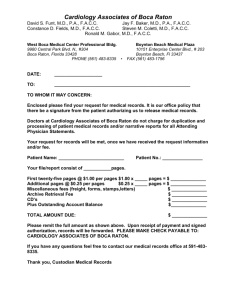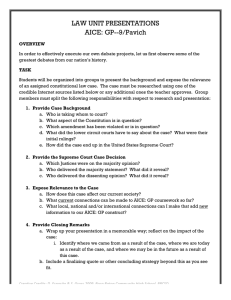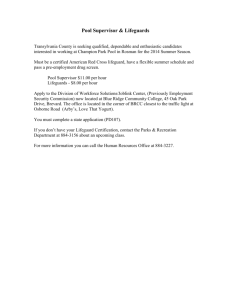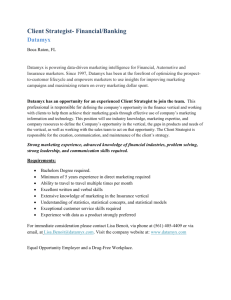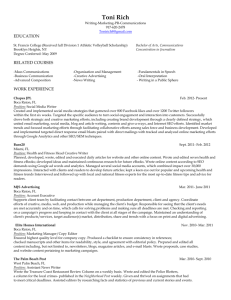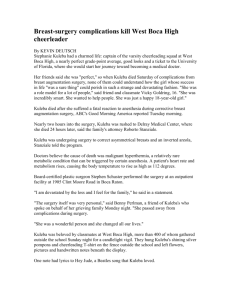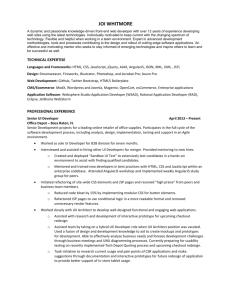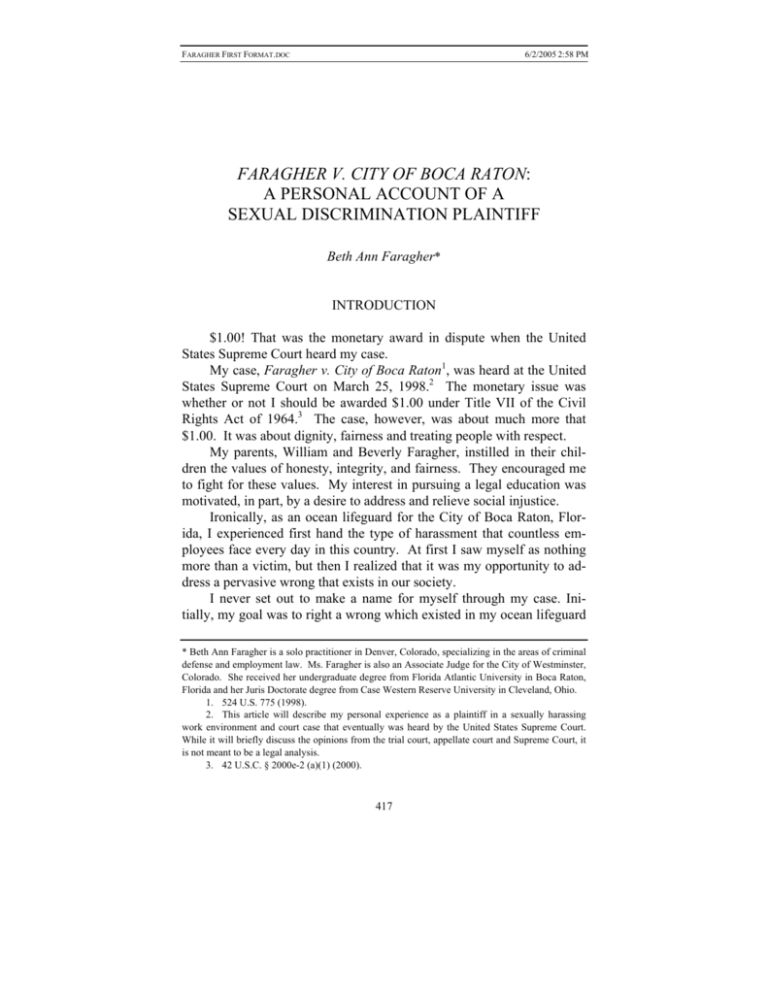
FARAGHER FIRST FORMAT.DOC
6/2/2005 2:58 PM
FARAGHER V. CITY OF BOCA RATON:
A PERSONAL ACCOUNT OF A
SEXUAL DISCRIMINATION PLAINTIFF
Beth Ann Faragher*
INTRODUCTION
$1.00! That was the monetary award in dispute when the United
States Supreme Court heard my case.
My case, Faragher v. City of Boca Raton1, was heard at the United
States Supreme Court on March 25, 1998.2 The monetary issue was
whether or not I should be awarded $1.00 under Title VII of the Civil
Rights Act of 1964.3 The case, however, was about much more that
$1.00. It was about dignity, fairness and treating people with respect.
My parents, William and Beverly Faragher, instilled in their children the values of honesty, integrity, and fairness. They encouraged me
to fight for these values. My interest in pursuing a legal education was
motivated, in part, by a desire to address and relieve social injustice.
Ironically, as an ocean lifeguard for the City of Boca Raton, Florida, I experienced first hand the type of harassment that countless employees face every day in this country. At first I saw myself as nothing
more than a victim, but then I realized that it was my opportunity to address a pervasive wrong that exists in our society.
I never set out to make a name for myself through my case. Initially, my goal was to right a wrong which existed in my ocean lifeguard
* Beth Ann Faragher is a solo practitioner in Denver, Colorado, specializing in the areas of criminal
defense and employment law. Ms. Faragher is also an Associate Judge for the City of Westminster,
Colorado. She received her undergraduate degree from Florida Atlantic University in Boca Raton,
Florida and her Juris Doctorate degree from Case Western Reserve University in Cleveland, Ohio.
1. 524 U.S. 775 (1998).
2. This article will describe my personal experience as a plaintiff in a sexually harassing
work environment and court case that eventually was heard by the United States Supreme Court.
While it will briefly discuss the opinions from the trial court, appellate court and Supreme Court, it
is not meant to be a legal analysis.
3. 42 U.S.C. § 2000e-2 (a)(1) (2000).
417
FARAGHER FIRST FORMAT.DOC
418
6/2/2005 2:58 PM
HOFSTRA LABOR & EMPLOYMENT LAW JOURNAL
[Vol. 22:417
community. It exceeded my greatest expectations and became a national
issue of human dignity and civil rights.
THE FACTS
Background
I was born and raised just outside of Cleveland, Ohio as the middle
child of five. During the summers, with five children under foot at
home, my mother excelled at motivating us to play outside and participate in sports. Our choices during the summer months were to attend
swim team practice every morning, or stay home and help with chores.
Needless to say, my siblings and I swam daily during the summers. The
competition was friendly, and the exercise was a great way to tire out the
five of us so we did not drive Mom totally crazy.
At sixteen, the natural progression in my swimming career was
lifeguarding. During high school I lifeguarded at local pools and lakes
in the Cleveland area. When I moved to Boca Raton, Florida to attend
college, lifeguarding helped me pay for college expenses.
Lifeguarding on the ocean was quite different than lifeguarding at a
pool or lake. In order to qualify for the open ocean lifeguard position, I
passed a rigorous physical test that included a 500 yard ocean swim in
fewer than nine minutes, a mile run in fewer than seven minutes, and
ocean rescues of drowning “victims.” After passing the test in 1985 I
started lifeguarding for the City of Boca Raton; I was nineteen years old.
At that time there were only two other female lifeguards in a squad of
approximately forty-five men due to the rigorous physical testing requirements.
At first ocean lifeguarding seemed like a dream job. The pay was
great, at approximately one and one-half times the then current minimum wage. The hours were great; we were paid for an eight-hour day
that included a one-hour morning workout and one-hour lunch break.
The environment was great; I was working on the beach in beautiful,
sunny south Florida . . . who could ask for more?
Boca Raton Marine Safety Division
The hierarchy of the Marine Safety Division (also known as the
“beach patrol”) of Boca Raton was similar to a military organization.
Lieutenants supervised the basic ocean lifeguards. Captains supervised
FARAGHER FIRST FORMAT.DOC
2005]
6/2/2005 2:58 PM
PERSONAL ACCOUNT OF BETH ANN FARAGHER
419
lieutenants, and the Chief supervised the Captains. When I started at the
City of Boca Raton, David Silverman was a Marine Safety Lieutenant
and William “Bill” Terry was the Marine Safety Chief.
The typical lifeguard morning routine included clocking in shortly
before the hour, completing a thirty to forty minute workout, and showering before the morning meeting that started at a quarter to the hour.
Either the Chief or a Captain conducted the morning meetings at Marine
Safety Headquarters. Headquarters was a small building consisting of a
locker room, a small meeting room where the lifeguard tower assignments were posted, a bathroom with one shower and one toilet, and an
office where the assigned captain(s) and/or chief worked. All of the
lifeguards shared the same locker room and bathroom.
The Harassment
The sexual harassment began almost immediately after I started
lifeguarding in the fall of 1985.4
David Silverman
David Silverman, a big man at approximately six feet two inches
and 225 pounds, pounded on the bathroom door when female lifeguards
were showering, asking to come in and shower with us. In the beginning
the female lifeguards showered alone. When Silverman’s behavior continued, the other female lifeguards and I began showering together for
protection. Can you imagine how this made us feel? We were old
enough to vote and to join the military, but we were too afraid to shower
alone in our place of employment for fear of harassment and possible
sexual assault.
Silverman repeatedly propositioned me to shower with him. He
stated, “Come on Beth, shower with me.” The answer was always,
“NO!”
Silverman owned a pickup truck with a camper on the back covering a bed inside. On rainy days, Silverman asked me to join him in the
back of his truck where he spent much of his time instead of sitting at his
assigned lifeguard tower. Silverman then predicted that his chances of
getting a “blow-job” were the same as the chances of rain, insinuating
4. I will describe some of the very explicit and crude language to which I was exposed, and I
apologize if it makes any of my readers feel uncomfortable. Unfortunately my personal experience
included being subjected to such language.
FARAGHER FIRST FORMAT.DOC
420
HOFSTRA LABOR & EMPLOYMENT LAW JOURNAL
6/2/2005 2:58 PM
[Vol. 22:417
that he would receive oral sex from me. These degrading comments
were often made in front of other lifeguards. They embarrassed and
humiliated me.
On any given day, David Silverman supervised a beach with four to
eight lifeguards assigned to it. He counted the number of female lifeguards assigned to his beach by saying he had twice as many “tits.” For
example, on a day he had three female lifeguards assigned to his beach,
he excitedly stated, “I have six tits on my beach today.”
Silverman negatively commented to me about the size and firmness
of my breasts, as well as approving of my “nice ass” and legs. In my
tower, he remarked to me about other women’s “tits.” His behavior was
inappropriate and distracting. While watching the water and beach to
protect lives, I was subjected to Lieutenant Silverman’s degradation of
other women and myself.
At Marine Safety Headquarters in a group of male and female lifeguards, this supervisor pantomimed performing oral sex on a woman by
throwing his head back and flicking his tongue in the air. I was absolutely offended.
David Silverman was not only crude and inappropriate with me but
with other female lifeguards as well. As a new female lifeguard sat at
her assigned tower on her first day of work, Silverman approached her
and stated, “I want to lick your clit.”
To another female lifeguard, in regard to a beach patron, Silverman
stated, “I’d love to eat between her legs.” He commented about this female lifeguard’s nipples being obvious under her bathing suit when it
was cold. Silverman subjected every female lifeguard to this type of behavior and language.
The most egregious and frightening incident I experienced with this
supervisor occurred while I did a beach run as a morning workout.
Silverman ran up behind me, tackled me, and rolled me in the sand. He
said “If you had tits, I’d do you in a minute.” Upset and humiliated, I
ran crying to a lifeguard captain whom I trusted. While sympathetic, he
discouraged reporting the behavior to City Hall, and in fact, he cautioned
against it. As a result, I learned to live with the egregious behavior and
comments.
At the time of these incidents, I was between nineteen and twenty
four years old; Silverman was in his thirties. His behavior was disgusting, intimidating, and wholly offensive. In 1989, while harassing the
other female lifeguards and myself, Silverman was promoted to Captain
in the City of Boca Raton Marine Safety Division.
FARAGHER FIRST FORMAT.DOC
2005]
6/2/2005 2:58 PM
PERSONAL ACCOUNT OF BETH ANN FARAGHER
421
William Terry
Bill Terry was Chief of the Marine Safety Division for the City of
Boca Raton throughout my employment from 1985 to 1990. He was
“god” on the beach patrol and supervised all of the lifeguards, lieutenants, and captains. Since the City of Boca Raton gave him almost
unlimited authority over the beach patrol, he knew he could get away
with harassing the female lifeguards. Terry was in his late thirties or
early forties. He was old enough to be my father, and definitely old
enough to know better.
Terry touched, grabbed, and stroked various body parts of myself
and the other female lifeguards including our buttocks, breasts, thighs,
waists, necks, and shoulders. Just about any body part was fair game to
Bill Terry. None of this contact was consensual; none of it was encouraged.
Nancy Ewanchew, another female lifeguard, worked for the City of
Boca Raton from 1987 to 1989. After a workout one day, she drank
from the water fountain at Marine Safety Headquarters while wearing
her city issued bathing suit. Terry came up behind her and rubbed his
genitals against her buttocks, simulating sexual movement.
Bill Terry used extremely derogatory language to describe female
lifeguards, including “bitch,” “stupid,” “slut,” and “cunt.” His language
indicated his absolute lack of respect for women. This was further demonstrated when a female lifeguard expressed her interest in applying for
the open lieutenant’s position, a level above the basic ocean lifeguard in
the beach hierarchy. Terry stated, “It will be a cold day in hell before I
promote a woman to lieutenant.” In the five years I worked on the beach
patrol, there were no female lieutenants, much less female captains or
chiefs.
Bill Terry and David Silverman both disparaged women by often
describing them in terms of their body parts. Bill Terry critiqued my
breasts, stating I was “man like” and “didn’t have a chest.” When
speaking to a another female lifeguard, Terry stated, “When God was
handing out tits, you must have been first in line.” While a woman interviewed for an open ocean lifeguard position, Terry asked her, “So, are
you going to fuck all the [male lifeguards] like the rest of the girls [female lifeguards]?” This was incredibly insulting because I dated one
male lifeguard during my five years with the City of Boca Raton. Besides, it was none of Bill Terry’s business whom the female lifeguards
dated.
FARAGHER FIRST FORMAT.DOC
422
6/2/2005 2:58 PM
HOFSTRA LABOR & EMPLOYMENT LAW JOURNAL
[Vol. 22:417
Personal Effects on Me
When these incidents occurred, I was upset, humiliated, embarrassed, afraid, and angry. The other female lifeguards and myself were
treated as objects, less than animals, with absolutely no respect. My
self-esteem suffered due to the behavior of these two supervisors.
In an effort to prevent further harassment, I made myself look androgynous. I stopped shaving my legs. I stopped wearing makeup. I
hid my body by covering up with towels or old gray t-shirts. By covering up the city issued red swimsuit I hoped the harassment would stop.
My efforts failed and the harassment continued.
In another effort to avoid harassment, I avoided Terry and
Silverman by staying away from the Marine Safety Headquarters unless
absolutely necessary. When my presence was required, I kept track of
Silverman and Terry’s whereabouts in order to stay out of their reach.
During morning meetings, I hid in the corner with my back to the wall to
avoid unwanted touching and grabbing.
I vented my anger and frustration by hitting the heavy bag in the
garage at headquarters. I believed it was all I could do about the harassment by my two supervisors.
Today, fifteen years after leaving the City of Boca Raton, I am still
embarrassed and humiliated and angry about the incidents of harassment
I suffered.
Reasons for Not Formally Reporting
Many people wonder why I did not formally report the harassment.
There were several reasons. When I reported some of the behavior to a
lifeguard captain, he discouraged reporting the incidents to City Hall,
and in fact, cautioned against it. The supervisors to whom I reported
were the ones harassing me. I feared losing my job. Bill Terry was
“god” on the beach patrol and those who crossed him suffered retaliation
such as bad schedules, poor tower assignments, or termination.
I was unaware of any sexual harassment policy or reporting mechanism during the time I worked for the City. In 1986 the City of Boca
Raton issued a sexual harassment policy, but I never saw it. The policy
was never posted anywhere in Marine Safety Headquarters. Hung in the
locker room at headquarters, however, was a poster of a semi-nude
woman clothed only in a sheer negligee. This showed me how my harassers felt about women, and strongly indicated that reporting the harassment would be unwise. Finally, as a women in a very male oriented
FARAGHER FIRST FORMAT.DOC
2005]
6/2/2005 2:58 PM
PERSONAL ACCOUNT OF BETH ANN FARAGHER
423
profession, I believed I had to “put up” with the behavior if I did not
want to be labeled a “sissy.”
Why I Stayed
Another common question is, “You worked there for five years.
Why did you stay?” If these two supervisors had not worked for the
City of Boca Raton, I might still be lifeguarding. It was an ideal job.
We worked six hours but were paid for eight. The pay was great. The
lifeguards were wonderful people except for these two supervisors.
Some of my closest friends today are lifeguards I met while working for
Boca Raton.
The City’s Investigation and the EEOC
Nancy Ewanchew, my co-worker in Boca Raton from 1987 to
1989, started a new lifeguarding job for Palm Beach County in 1989. In
the spring of 1990, one year and one day after she started her new position, she wrote to the City of Boca Raton, reporting that the female lifeguards were being harassed by two of their supervisors. She waited to
write her letter because of her one-year probationary period at her new
job. She feared Bill Terry would make a phone call, and cause her to
lose her job if she were still in the probationary period. Ms. Ewanchew
also feared Bill Terry would get her blacklisted as a lifeguard in south
Florida.
The City of Boca Raton started its investigation, and called the female lifeguards to City Hall one at a time. We were given no notice and
thus were unable to have the attorney, with whom we were consulting,
present with us. We were scared to death! David Silverman, one of my
harassers, came to my tower and told me to report to City Hall. He
knew exactly why I was called to City Hall and was afraid I would tell
the truth. He stated to me “I guess you’re going to do what you have to
do.” It was very intimidating and absolutely inappropriate!
At City Hall, I was questioned in a room with approximately four
men I had never met. They wore business suits while I wore my cityissued red bathing suit, a t-shirt and shorts. They asked about the extremely embarrassing and demeaning things that had happened to me. It
was awful!
Through the investigation, the city determined that inappropriate
behavior had occurred. As a result, Silverman was docked forty hours
vacation time, and Terry was docked one hundred and sixty hours vaca-
FARAGHER FIRST FORMAT.DOC
424
6/2/2005 2:58 PM
HOFSTRA LABOR & EMPLOYMENT LAW JOURNAL
[Vol. 22:417
tion time. I was upset about the “discipline,” believing it was merely a
slap on the wrist for very egregious behavior. I was also angry that both
of my harassers still worked for the City of Boca Raton, making a very
decent living. Disagreeing with the City’s resolution of the matter, I
filed my complaint with the Equal Employment Opportunity Commission (“EEOC”) in the winter of 1990.
Around the same time, Nancy Ewanchew and I attended a sexual
harassment seminar sponsored by the National Organization for Women.
We met William “Bill” Amlong, who became our attorney. He was very
caring and sympathetic about our situation, and extremely knowledgeable about sexual harassment law.
After the two-year long EEOC process, I obtained my Right to Sue
letter. Bill Amlong filed a complaint in federal district court in Miami in
early 1992 on behalf of Nancy Ewanchew and I. The other female lifeguards were invited to join the lawsuit but they all declined. I believe
they were scared since most still worked for the City of Boca Raton.
By this time, I had moved back to Cleveland, Ohio and was attending law school at Case Western Reserve University. Due to our lawsuit,
I took Employment Law as an elective course. Although I was 1,100
miles away from Boca Raton, the five years of harassment I suffered
never left myself. When I thought about it, my emotions varied from
depression to anger. I felt depressed because of my helplessness at the
time and because of the damage done to so many others and me. I felt
angry because the two supervisors had harassed us, gotten away with it,
and still worked for the City of Boca Raton, several years after the fact.
THE LEGAL CASE
Trial
Prior to trial, I flew to Florida several times for my deposition and a
settlement conference. After graduating from law school in 1993, I
moved to Colorado and began working for the Denver municipal public
defender’s office.
In June 1994 Nancy (Ewanchew) Oakland and I knew that our sexual harassment case would go to trial soon but we did not have an exact
date. One Monday morning, I was working in Denver County Court,
preparing to proceed to jury trial with my client. A colleague came and
informed me that I must be in Miami the next day at 9:00 a.m. for the
start of my federal sexual harassment trial. The case with priority settled
FARAGHER FIRST FORMAT.DOC
2005]
PERSONAL ACCOUNT OF BETH ANN FARAGHER
6/2/2005 2:58 PM
425
so our trial would start the next morning. Fortunately, my colleagues
were able to cover my public defender cases while I caught a flight to
Florida, as it would not have been wise to tell the federal court to wait.
The trial lasted four days in the United States District Court for the
Southern District of Florida. Our witnesses included five other female
lifeguards, the former male lifeguard captain to whom I went crying after I had been tackled, Nancy (Ewanchew) Oakland, and myself. The
defense case included testimony from David Silverman and Bill Terry,
who were both individual defendants. They took the stand in federal
court, swore to tell the truth, and then denied anything had ever happened. The last thing we expected was the truth, and they did not disappoint us!
The defense case suggested that the female lifeguards had made up
the entire case. It was ridiculous to think I would have pursued a fictional case for four years, paid for several expensive trips to Florida, and
took time off from my new job in Denver. If I had made it up, I would
have come up with a much more colorful story.
The federal magistrate judge found our witnesses quite credible,
Silverman and Terry less than credible and ruled in our favor. By winning we felt vindicated. After pursuing the case for four years, we had
proven there was sexual harassment.
Under my Title VII hostile work environment claims, the trial court
found the City of Boca Raton had constructive knowledge, and therefore
indirect liability, of harassment because of its pervasiveness.5 The court
further found liability because the supervisors were agents of the City,
and based on knowledge by another agent of the City, the lifeguard captain to whom I reported Silverman’s behavior.6 Since the 1991 amendments to the Civil Rights Act were not applicable, as the conduct occurred between 1985 and 1990, the court awarded me $1.00 in nominal
damages.7 This meant the City of Boca Raton would be responsible for
paying my attorneys’ fees and costs.8
5. Faragher v. City of Boca Raton, 864 F. Supp. 1552, 1563 (S.D.Fla. 1994).
6. Id. at 1564.
7. Id. at 1565.
8. As for our other claims, Nancy (Ewanchew) Oakland was awarded $35,000 in compensatory damages for her battery claim against Bill Terry and $2,000 in punitive damages against Bill
Terry. Id. at 1568. I was awarded $10,000 in compensatory damages on my 42 U.S.C. § 1983
claim against Silverman and Terry, jointly and severally, and $500 in punitive damages on my battery claim against Terry. Id.
FARAGHER FIRST FORMAT.DOC
426
6/2/2005 2:58 PM
HOFSTRA LABOR & EMPLOYMENT LAW JOURNAL
[Vol. 22:417
Appeal
Many plaintiffs do not realize that their cases are not always finished after a trial. In many cases, one or both sides appeal. That is what
happened in my case. We appealed the trial court’s denial of our state
law claims, and the City appealed on the trial court’s determination of
liability under Title VII of the Civil Rights Act. The Eleventh Circuit
Court of Appeals originally issued a panel opinion.9 However, that was
vacated and a rehearing en banc was granted.10 The first issue on appeal
was whether the City of Boca Raton could be held “liable under Title
VII for Terry’s and Silverman’s hostile environment sexual harassment
of [me], regardless of its actual or constructive knowledge of that harassment.”11 The second issue was “whether the City knew or should
have known of Terry’s and Silverman’s hostile environment harassment
of [me].”12
The Eleventh Circuit reversed the trial court’s decision of my Title
VII claim.13 It held that the City of Boca Raton had no actual knowledge
of the harassment, and therefore was not directly liable under Title VII.14
The Eleventh Circuit also held that the supervisors were acting outside
the scope of their employment and had not been assisted by their agency
relationship with the City, and thus were not vicariously liable under Title VII.15 This meant my $1.00 award was taken away, and my attorney’s fees and costs would not be paid by the City of Boca Raton.
Certiorari and the Media
We filed for certiorari to the United States Supreme Court. As an
attorney, I knew the chances of cert being granted were about the same
chances of me winning the lottery. One Friday in mid-November 1997,
I returned to my office after finishing my public defender docket. My
paralegal Neil informed me I had a phone call. I did not recognize the
name but that was common due to my large caseload. It was a reporter
from a Chicago paper who asked how I felt about the Supreme Court
granting certiorari on my case. I was shocked and said, “ What are you
9.
10.
11.
12.
13.
14.
15.
Faragher v. City of Boca Raton, 76 F.3d 1155 (11th Cir. 1996).
Faragher v. City of Boca Raton, 83 F.3d 1346 (11th Cir. 1996).
Faragher v. City of Boca Raton, 111 F.3d 1530, 1534 (11th Cir. 1997).
Id.
Id. at 1539.
Id.
Id.
FARAGHER FIRST FORMAT.DOC
2005]
6/2/2005 2:58 PM
PERSONAL ACCOUNT OF BETH ANN FARAGHER
427
talking about?” I had not yet received Bill Amlong’s messages informing me that cert had been granted. I was thrilled!
The media became overwhelming. I accepted the guidance and expertise of the National Organization for Women to ensure my case received a great deal of public exposure. While it felt like my fifteen minutes of fame, I believed it was a worthwhile cause. Win or lose, I
thought disseminating my story would lead to increased knowledge and
thus, advancement in the area of sexual harassment prevention. By publicly sharing my embarrassing and degrading experiences, I hoped to encourage others to come forward and report their own harassment situations. This became my mission and an opportunity for me to relieve
social injustice.
Numerous reporters asked if I would travel to Washington, D.C. to
hear the oral arguments on my case. After considering it, I decided to
attend as it was a once in a lifetime opportunity. How many attorneys
get to watch their cases argued before the United States Supreme Court?
Bill Amlong suggested I get sworn in to practice before the United
States Supreme Court on the same day. I completed my paperwork, paid
one hundred dollars, and sat right up front with the other inductees.
Supreme Court
My sister and best friend, Kit, traveled to Washington, D.C. with
me. We stayed with our friend Doug Clancy, an attorney who was also
sworn into the United States Supreme Court. On March 25, 1998, Kit,
Doug and I arrived at the Supreme Court and walked around looking for
the inductee entrance. As we passed the front of the building, a gentleman with students saw me and said, “There she is. There’s Beth Ann
Faragher. Good luck Ms. Faragher.” I felt famous! Kit and Doug were
incredulous at a stranger recognizing me.
In the courtroom, many of the reporters, whom I had met at earlier
press conferences, recognized me; they whispered and waved. As we
were sworn in and my name was called, Justice O’Connor recognized it
and leaned over to whisper to Justice Stevens. She knew my case would
be heard in just a few moments. I was elated; my feet did not touch the
ground!
Listening to the arguments felt like an out of body experience.
Nine of the most powerful people in the nation, if not the world, were
talking about what had happened to me. The Justices were proper when
discussing the incidents of harassment, and did not use graphic details.
Instead, Justice Ginsburg described the acts of my harassers as “the
FARAGHER FIRST FORMAT.DOC
428
6/2/2005 2:58 PM
HOFSTRA LABOR & EMPLOYMENT LAW JOURNAL
[Vol. 22:417
deeds.” The focus of the Justices was not my case, but what should be
done to prevent others from suffering through the type of harassment
that I had endured.
The Holding
The United States Supreme Court held that under Title VII “[a]n
employer is subject to vicarious liability to a victimized employee for an
actionable hostile environment created by a supervisor with immediate
(or successively higher) authority over the employee.”16 When there is
no tangible employment action, such as discharge, demotion, or undesirable reassignment, taken against the employee, an employer can raise a
two part affirmative defense to liability or damages, requiring proof of
both elements by a preponderance of the evidence.17 The employer must
prove it “exercised reasonable care to prevent and correct promptly any
sexually harassing behavior,” and “that the plaintiff employee unreasonable failed to take advantage of any preventive or corrective opportunities provided by the employer or to avoid harm otherwise.”18 When a
tangible employment action has occurred, the affirmative defense is not
available to the employer so as to subject it to vicarious liability.19
Since no tangible employment action was taken against me, the
City of Boca Raton had, in theory, the possibility of raising the affirmative defense. In this vein, the Supreme Court stated: “While the City
would have an opportunity to raise an affirmative defense if there were
any serious prospect of its presenting one, it appears from the record that
any such avenue is closed.” 20 The City of Boca Raton failed to disseminate its sexual harassment policy to the Marine Safety employees,
failed to oversee Marine Safety supervisors’ conduct, and failed to provide a mechanism for bypassing harassing supervisors in the complaint
process in its sexual harassment policy.21 As a matter of law, the Supreme Court held “the City [of Boca Raton] could not be found to have
exercised reasonable care to prevent the supervisors’ harassing conduct.”22 In addressing the second part of the affirmative defense, the
Supreme Court held there was no reason to remand to determine my ef16.
17.
18.
19.
20.
21.
22.
524 U.S. 775, 807 (1998).
Id.
Id.
Id. at 808.
Id.
Id.
Id.
FARAGHER FIRST FORMAT.DOC
2005]
6/2/2005 2:58 PM
PERSONAL ACCOUNT OF BETH ANN FARAGHER
429
forts to mitigate damages since I had only been awarded nominal damages of $1.00.23 The decision of the District Court awarding me $1.00
under Title VII of the Civil Rights Act was reinstated.24
Present Effects
I believe the Supreme Court’s ruling in my case is helping to prevent sexual harassment by requiring employers to take affirmative preventative steps, such as implementing formal policies and sensible complaint procedures.
My law practice includes representing individuals in employment
cases. These cases are special to me as I was once a plaintiff in their
shoes and understand what they have lived through. Representing others
who have suffered discrimination allows me to help alleviate social injustice.
As of the time of this writing, I have still not received my dollar
from the City of Boca Raton. If and when I do receive my $1.00, I will
frame it on my office wall as a reminder that we can make a difference.
THE CHALLENGE
Every person is provided an opportunity to make a positive difference in this world. Many times, the opportunity comes in an unexpected
manner, time, or place, and is difficult to identify. The key is to summon up the courage to follow what we believe in and to protect human
dignity and rights.
Attorneys have the ability to assist others through the law, to better
individual lives, and therefore, the lives of us all. We need to recognize
these opportunities for ourselves, and to support others presented with
these opportunities, and the hardships involved. I could not have done
this alone and know that others cannot. We all need to help where we
can.
23. Id. at 809.
24. Id. at 810.

